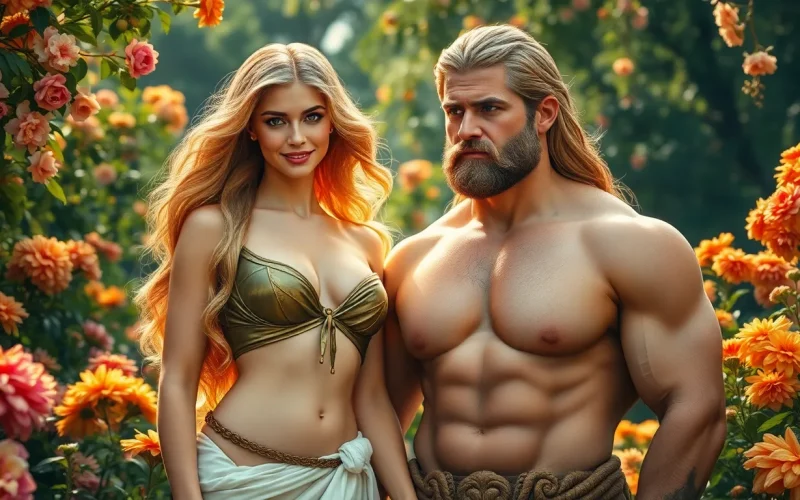Table of Contents
ToggleIn the realm of Greek mythology, love and beauty reign supreme, and no one embodies these qualities quite like Aphrodite. But if you think her life is all about frolicking in fields of flowers and charming the gods, think again. This goddess of love has a rather interesting marital status that’s bound to pique anyone’s curiosity.
Overview of Aphrodite
Aphrodite emerges as a prominent figure in Greek mythology, symbolizing love and beauty. She embodies various aspects of affection including passion, attraction, and desire. This goddess frequently appears in numerous myths, often influencing both gods and mortals alike through her enchanting power.
One key aspect of Aphrodite’s narrative involves her marriage to Hephaestus, the god of fire and craftsmanship. Their union serves as a notable contrast to Aphrodite’s nature, as Hephaestus represents more practical pursuits. Despite this marriage, Aphrodite is known for engaging in several extramarital relationships, most famously with Ares, the god of war. These affairs shed light on her complex character that intertwines devotion and infidelity.
The mythological tales surrounding Aphrodite often showcase her dual role as both an idealized figure of beauty and a symbol of the tumultuous nature of love. Conflicts arise due to her relationships, creating a rich tapestry of interactions with both divine and mortal beings. Her influence extends beyond her marital status, affecting the fates and fortunes of others in her realm.
Fascination with Aphrodite persists in modern culture, where she continues to inspire art, literature, and psychology. Her legacy highlights the enduring nature of love, revealing both its ecstatic joys and its profound challenges. These themes resonate throughout various texts, ensuring that Aphrodite remains a significant figure in examining the complexities of human relationships.
Aphrodite’s Marriage to Hephaestus

Aphrodite’s marriage to Hephaestus showcases the contrast between beauty and practicality. Hephaestus, the god of fire and craftsmanship, plays a pivotal role in mythology, symbolizing creation and innovation. Stories often depict him as a skilled artisan, creating remarkable artifacts for gods and mortals. His work includes the crafting of magnificent weapons and stunning jewelry, underscoring his significance in the pantheon. Additionally, despite his physical imperfections, Hephaestus embodies resilience and intelligence, providing a narrative depth that enriches their marriage.
Their union highlights a complex dynamic filled with both love and tension. Aphrodite represents romantic desire, while Hephaestus signifies stability and loyalty. This contrast creates conflicting emotions, as Aphrodite’s attraction to Ares, the god of war, complicates their relationship. Moments of infidelity serve as a reminder of the struggles faced by many couples. Despite this, the marriage illustrates the multifaceted nature of love, encompassing attraction, loyalty, and even heartache. The stories around Aphrodite and Hephaestus reflect enduring themes of desire and fidelity in mythology.
Affairs and Relationships of Aphrodite
Aphrodite’s relationships reveal her complexities beyond beauty and love. Her connections often intertwine with themes of desire and conflict.
Connection with Ares
Aphrodite’s relationship with Ares, the god of war, embodies tumultuous passion. Their affair exemplifies raw attraction, contrasting sharply with her marriage to Hephaestus. Myths depict moments of secrecy, where she and Ares engage in romantic escapades, often hidden from her husband. The union leads to the birth of several children, such as Eros and Harmonia, symbolizing love’s intertwined nature with strife. Their relationship stands out not just for its intensity but its impact on the divine hierarchy, causing ripples among the gods.
Other Notable Lovers
Aphrodite’s allure draws the attention of many, resulting in several notable liaisons. One such lover is Adonis, a mortal renowned for his beauty, whom she deeply loves. Their bond highlights the goddess’s tendency toward fleeting relationships. Another significant figure is Dionysus, the god of wine, whose free spirit matches her own spontaneity. These connections enrich her storyline, illustrating love’s diversity and challenges. They emphasize how Aphrodite navigates affection and heartbreak, contributing to her enduring legacy in mythology.
Cultural Depictions of Aphrodite’s Marriage
Aphrodite’s marriage to Hephaestus has sparked significant interest throughout history. Artists and writers often explore the contrasts between her beauty and his craftsmanship.
Representations in Art and Literature
Art and literature frequently depict Aphrodite’s marriage in diverse ways. Classical sculptures illustrate her ethereal beauty alongside Hephaestus, highlighting their contrasting characteristics. Poets like Homer and Hesiod emphasize themes of discord and passion stemming from their relationship. In modern literature, various authors reinterpret these dynamics, portraying Aphrodite as a figure torn between loyalty and desire. This exploration reflects deeper human emotions, showcasing love’s complexities alongside societal expectations.
Influence on Modern Interpretations
Modern interpretations of Aphrodite’s marriage resonate with contemporary audiences. Films and novels often reimagine her relationship with Hephaestus, framing it within current discussions around fidelity and identity. Many contemporary works draw inspiration from her narratives, exploring themes such as infidelity and personal growth. Influencers and artists frequently reference her story, emphasizing how her experiences mirror contemporary relationship challenges. These modern depictions maintain Aphrodite’s relevance, illustrating both her timeless allure and the ongoing struggle within love.
Aphrodite’s marriage to Hephaestus stands as a testament to the complexities of love and relationships in mythology. Their union, marked by stark contrasts, reveals the intricate balance between beauty and practicality. While Hephaestus embodies stability and loyalty, Aphrodite’s passionate nature often leads her down tumultuous paths.
Her affairs and connections with figures like Ares and Adonis highlight the duality of love, showcasing both its ecstatic joys and heart-wrenching challenges. This rich tapestry of relationships not only defines Aphrodite’s character but also resonates with audiences today. Through art and literature, her story continues to inspire and reflect the timeless struggles of love, making her an enduring symbol of both desire and heartache.





